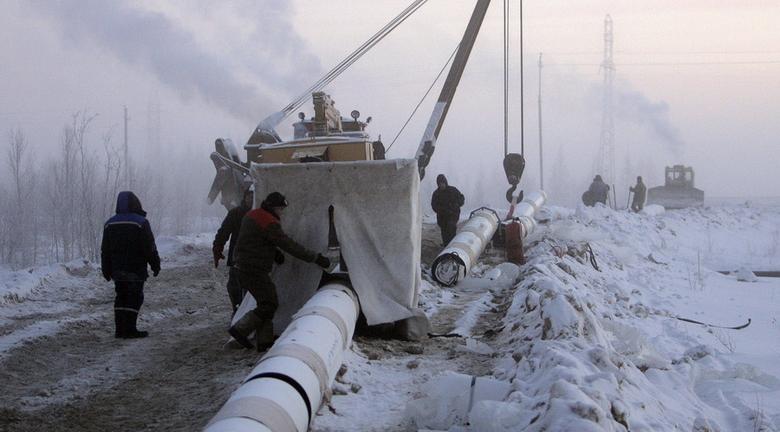
NORD STREAM: THE PERFECT OPPORTUNITY

The Swiss-registered Nord Stream 2 company replied this week to the howl of protest that its project has evoked in former eastern bloc countries.
Companies wanting to spend their own money to build pipelines to ship their own gas to markets where production is falling are normally welcomed, but projects involving Russia have an extra hurdle to overcome: opposition from its former satellites in eastern Europe.
Nord Stream 2 was responding to the letter reportedly delivered to the president of the European Union Jean-Claude Juncker by the governments of at least seven states: the Visegrad Group – Poland, Hungary, Czech Republic and Slovakia – and three former Soviet republics: Estonia, Lithuania and Latvia. Romania and Croatia have also reportedly signed.
If the project goes ahead, Nord Stream 2 would generate "potentially destabilising geopolitical consequences," the letter says, according to a Reuters report.
"The Nord Stream 2 project that is currently under preparation can pose certain risks for energy security in the region of central and eastern Europe," it says, and "it would strongly influence gas market development and gas transit patterns in the region, most notably the transit route via Ukraine."
Rebutting the letter, in a statement on its website March 21, Nord Stream 2 said that "EU energy supply has never been more diverse than it is today, in contrast to the letter's claim of threats to security of supply and diversification of sources, suppliers and routes." It said the line will increase security of gas supply for the whole EU and "precisely those countries who worry most about dependence on one gas supplier have the most to gain from projects like Nord Stream 2, which will enable them to procure more gas through a competitive internal market and from more diverse supply routes."
It says that two thirds of the gas will flow towards the Central European Gas Hub in Baumgarten, Austria. "This hub offers ideal connectivity and can handle large flows to central, east, southeast and south European countries, boosting their gas markets to comparable levels of liquidity and competiveness as in northwest Europe."
If Nord Stream 1 was operating at close to 80% of capacity in 2014, and met its shippers' nominations in full, as it claimed this week, then its assertion about the security of another, almost parallel, line seems fair.
And as NGE has pointed out before, building Nord Stream 2 does not prevent Gazprom from shipping gas to Romania and Bulgaria and Turkey through Ukraine, let alone to its existing customers such as Shell and Uniper, whose EU gas production is declining.
The world has changed
Another legitimate question is how the line could have geopolitical consequences, given the upheavals in the pipeline systems and energy markets generally. The balance of power has shifted dramatically in Europe's favour since the bad old days of 2009, whatever the UK energy secretary Amber Rudd may say about Russia using gas as a weapon.
Gazprom has started using gas auctions – it has had two so far since last autumn, with one last week for the Baltic states resulting in most of the gas being sold – as a supplement to long-term contracts; LNG terminals are proliferating, with Poland's first LNG cargo due in July from Qatar; and low oil prices and competition have forced down the price of Gazprom's pipeline gas. Reverse flow has enabled traders to run rings around Gazprom, taking gas from the east and sending it back east again into Ukraine. Elsewhere, floating LNG and short pipelines from shore to grid are the way forward for smaller markets with worse connection.
Looking at the map of the EU today, Russia has not been very successful if its goal was to use gas as a weapon. Finding greater overall value in leaving than staying in the sphere of influence of that particular union, the eastern European and Baltic states are now inside the EU and enjoying the financial benefits of membership.
Even though over a decade has elapsed since joining, not all of these countries have yet taken on board the EC's ambitions for energy markets. State-owned monopolies continue to hold sway; the loss-making coal sector remains too sensitive to close; and foreign investors are finding themselves at a disadvantage to the national champions.
Nord Stream 2, dominated by Gazprom, knows better than to criticise where national champions are concerned; but it takes the EU member states to task in the matter of coal: in its statement, it says that for "electricity production, gas is the cheapest and quickest solution for cutting CO2 emissions by 50% in comparison to coal. Regrettably, the letter to Commission President Juncker fails to recognize any of the benefits of additional gas imports for the global climate and the European environment."
EU-Compliant
Nord Stream 2 also said it was fully committed to the rule of law and hinted that it was being discriminated against. "The project will only go ahead based on approvals and instructions from the competent authorities of the countries whose jurisdiction Nord Stream 2 crosses. This process is based on EU law, national legislation and international conventions," it said.
By contrast, "no gas import pipelines from third countries to the EU's internal market are subject to the Third Energy Package. North African pipelines and Nord Stream have always been treated as outside the scope of the TEP. Even Norwegian import pipelines, which are within the internal market, are categorised as 'upstream' and thereby excluded from key provisions of the TEP. The legal precedent is very clear."
It is also very clear that this will not be the final word on the matter. But as NGE has pointed out, there are other factors militating against Gazprom's bold scheme, such as low gas prices, the weak ruble and unresponsive gas demand which may ultimately decide the pipeline's fate when the partners come to take their final investment decision this year.
-----
More:
RUSSIA’S ENERGY STRATEGY - 2030





